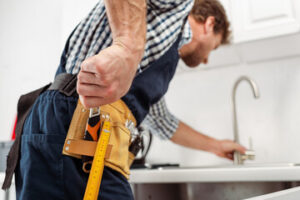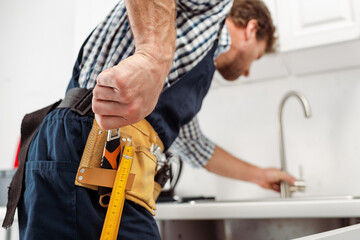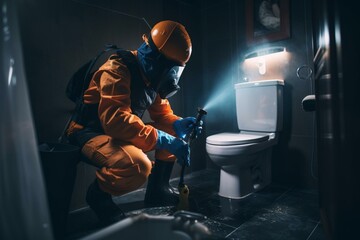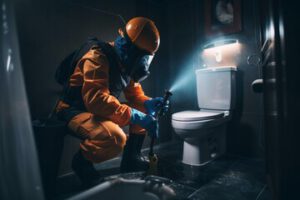Plumbers deal with clogged toilets, pipes, and other plumbing emergencies. They have the skills and tools to fix your plumbing problems quickly and efficiently. Trying to do it yourself can lead to bigger repairs and more damage to your property.
Understanding how plumbing works can help you avoid major repairs and keep your home safe. Read on to learn more about the basics of home plumbing.

In order to become a plumber, you need to have several qualifications. These include years of training and experience, licensing, and insurance. A good plumber should be able to perform a wide variety of tasks and be able to handle complex plumbing jobs, such as installing backflow prevention devices. He or she should also be able to read blueprints and understand the basics of physics and construction.
Most states require plumbers to be licensed, although the requirements vary from state to state. Some require a high school diploma, while others have more stringent educational standards, such as classes in drafting and physics. Regardless of the requirements, most states have apprenticeship programs that combine educational hours and on-the-job training. Many apprentices are sponsored by plumbing companies or local unions. Others attend vocational or trade schools to learn plumbing codes, regulations, and drafting.
After completing an apprenticeship, you need to get your license. Most states have a list of approved licensing agencies. You can find this information on your state’s website. You will need to fill out an application, provide character references, and pay a fee. Most states also require that you have at least two years of on-the-job experience under a master plumber.
A good plumber should carry liability insurance. This protects you if the plumber damages your property or gets injured on the job. Some home insurance policies include coverage for damage caused by plumbing problems, but it’s important to talk with your insurance agent before you hire a plumber to make sure you’re covered.
Plumbers need to be physically fit and able to work in tight spaces. In addition, they need to be customer service oriented and detail-oriented. They must also be able to follow directions and follow building codes and safety procedures. Finally, plumbers need to have excellent math skills and the ability to work well under pressure.
A plumber who works on residential properties needs to have a state contractor’s license, which is issued by the Registrar of Contractors. This license covers both commercial and residential plumbing work. Plumbers also need to have a current backflow test certificate. In addition, they should have at least $25,000 in general liability insurance and workers’ compensation.
If you are planning to be a home plumber, it’s important to have the right licenses to work legally. Licensing requirements tend to vary slightly from state to state, and individual municipalities often make their own rules as well. If you’re unsure what your local requirements are, contact your governing body or search online. Having the right plumbing license will help you avoid fines and penalties, as well as protect your customers from shoddy workmanship.
In , for instance, to be licensed as a journey plumber you need to have completed an apprenticeship program and passed a state exam. The exam consists of two parts, a written exam and a practical exam. The written exam covers the 2020 New York plumbing code, while the practical exam tests your ability to install and repair piping systems. In addition to passing the exams, you need to pass a criminal background check and provide character references.
To become a master plumber, you must have at least ten years of experience at the journey level. The majority of this experience must be as a journey plumber, but you can count some of your time as an apprentice or foreman to meet the requirement. Applicants must also pass an exam and submit a bond. In some cases, you will need to take a safety course.
Some states, such as , require a state contractor’s license to perform plumbing work. To obtain this license, you must have at least five years of experience as a journey plumber and complete an exam. You must also pass a background check and child support verification. Having the right license will allow you to work as a plumber in any state, but it’s important to check with your local governing body for any additional licensing requirements.
In some areas, you may need a plumbing license to remove underground storage tanks or handle hazardous waste. In other cases, you may need a certificate from the local fire department to inspect and approve the installation of gas piping. In addition, many cities and counties require that you carry liability insurance to be a licensed plumber.
Home plumbers need insurance to protect themselves and their customers. There are numerous insurance providers that offer policies specifically for plumbing companies and contractors. These policies can include workers’ compensation, commercial auto, liability coverage and more. Some of these insurers also provide additional services, such as online claims reporting, risk management tools and free OSHA training. In addition, some of these insurers offer low premiums for residential and commercial plumbers.
Whether you need a plumbing company for repairs or installation, you should choose a company with a solid reputation and great customer service. A good way to find out more about a company is to look for reviews online. In addition, you can visit your local Better Business Bureau (BBB) to see if any complaints have been filed against the company.
If you’re a homeowner, consider supplementing your homeowners insurance policy with a home warranty plan. These plans typically cover items that break down due to normal wear and tear, and they may cover the cost of a new toilet or dishwasher. They’re not a replacement for regular maintenance, however, which is why it’s important to do things like flush your toilets and check water lines for leaks regularly.
One common question people have is whether or not their home insurance covers a plumbing problem. Most homeowners’ policies will cover sudden damage to the property caused by plumbing issues, such as a burst pipe from freezing weather or a toilet that overflows. However, many of these policies exclude issues that occur over time, such as a drain line that becomes blocked or a faulty faucet that needs to be replaced.
In some cases, you can buy a separate insurance policy to cover these types of incidents. For example, some insurance providers offer sewer line protection, which covers damage to the pipes that connect your home to the public sewer system. Other coverage options include flood protection, which covers damage caused by rising waters such as river or tidal surges. Homeowners who live in flood zones should consider purchasing this type of insurance to protect their homes against catastrophic damage.
Whether you need a plumber to fix a broken toilet, unclog a drain or install a new kitchen, bathroom or laundry room, you want a reputable professional. Unfortunately, dishonest plumbers exist, and they can cost you more money than the job is worth. You can protect yourself from these scammers by knowing what to look out for.
Plumbers often have hourly rates, but they also can charge flat fees for certain types of jobs. Some plumbers may also try to upsell you on services you don’t need. For example, they might tell you your plumbing is in need of an overhaul and suggest a complete replacement. This can add up quickly, so it’s important to shop around for the best prices on these upgrades.
One way to find a reliable plumber is to ask for referrals from friends and family. But be wary of plumbers who pressure you into hiring them with scare tactics or high-pressure sales techniques. These plumbers are often looking to take advantage of people in vulnerable positions, such as the elderly or recently arrived immigrants. These individuals might not understand English and be more likely to fall for these scams. In addition, you can check your local Better Business Bureau to see if any complaints have been filed against a plumber in your area.





